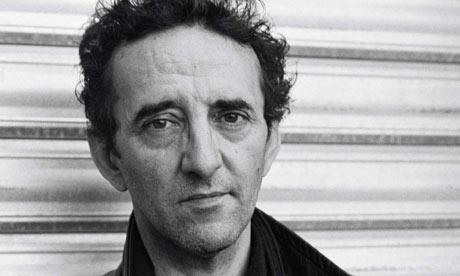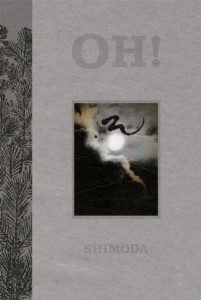It is Friday: Go Write Ahead
Reason, Magic, Skill and Love
Frankly, I think poorly of
Taste the drink, add a little more whiskey, taste again, now put the bottle aside
Oh, I’ll stagger
An open can spread frank before the sky
Cheap gin, cheap ginger ale, not much ice
The mere attempt to examine my own confusion would consume volumes
I like to drink and read with my mom
Anyone’s who drunk, I know it myself, they’re likely to exaggerate
Rye whiskey in the green celluloid glass of a bathroom
It’s just the thing for shock
God doesn’t believe in the easy way
Precede into the kitchen
I don’t even drink anymore, just wine
This is one gigantic day
But you’ve got tomorrow to reckon with
RIP Captain Beefheart
Adding to the list of legends taken in 2010, Don Van Vliet dies at 69.
Damn, yeah!

Joseph Young’s Easter Rabbit is re-released with a beautiful new cover. (Just a bit of it above. Link on through for the whole pretty thing.)
Higgs reviewed it here. If you missed it on the first go round, hop on for the new one, you. There’s some new goodness.
Enter the Beecher’s poetry and fiction contest and win $500. Judges are Deb Olin Unferth for fiction and Adam Robinson (me) for poetry.
Roberto Bolaño: “Instead of waiting, there is writing.”

“The truth is, I don’t believe all that much in writing. Starting with my own. Being a writer is pleasant—no, pleasant isn’t the word—it’s an activity that has its share of amusing moments, but I know of other things that are even more amusing, amusing in the same way that literature is for me. Holding up banks, for example. Or directing movies. Or being a gigolo. Or being a child again and playing on a more or less apocalyptic soccer team. Unfortunately, the child grows up, the bank robber is killed, the director runs out of money, the gigolo gets sick and then there’s no other choice but to write. For me, the word writing is the exact opposite of the word waiting. Instead of waiting, there is writing. Well, I’m probably wrong—it’s possible that writing is another form of waiting, of delaying things. I’d like to think otherwise.”
from interview in Bomb, 2002
Literature is an epic game of scrabble.
‘Kool-Aid Man in Second Life’
by Jon Rafman
[Click the image above to make it play]
This gets totes NSFW toward the end, btw. Yum yum. READ MORE >
“DEAD DEAD,” Quraysh Ali Lansana
DEAD DEAD
heat on the southside
I.
last night, police cordoned the four square
blocks surrounding my house in pursuit of a thug
who unloaded on the shell of a gangsta
in the funeral parlor filled with formaldehyde
and lead. black folks scattered, staining
complicated streets. i settle in for summer:
the maze to the front door, running teens
smelling of weed and tragedy from my stoop
reminding my sons they are not sources
of admiration, praying that might change. not yet
june heat rises like the murder rate, gleam
and pop already midnight’s bitter tune
II.
fifteen years ago, tyehimba jess
told me about a funeral home
with a drive through window.
you pull up, push a call button
through bulletproof glass a friendly
somber attendant takes your request.
I Am Intrigued by Chin Music Press
 One of the things I love most about attending literary events is learning about presses and writers with which I am not familiar. At the Pop Up Bookstore in Chicago this past weekend, I found this gorgeous book, Oh, by Todd Shimoda with artwork by Linda Shimoda, published by Chin Music Press. As an art object, this book is gorgeous–heavy, textured papers, a gorgeous hardcover, and though I just started the book, I haven’t been able to put it down. I decided to look them up online and they have a lot going on. I was especially interested in this blog post, by Bruce Rutledge, about books as art objects and what it costs to publish beautifully designed books. Check them out.
One of the things I love most about attending literary events is learning about presses and writers with which I am not familiar. At the Pop Up Bookstore in Chicago this past weekend, I found this gorgeous book, Oh, by Todd Shimoda with artwork by Linda Shimoda, published by Chin Music Press. As an art object, this book is gorgeous–heavy, textured papers, a gorgeous hardcover, and though I just started the book, I haven’t been able to put it down. I decided to look them up online and they have a lot going on. I was especially interested in this blog post, by Bruce Rutledge, about books as art objects and what it costs to publish beautifully designed books. Check them out.
Typo Antoine Argos Film Parrhesia

1. Of all the online issues of magazines I’ve read and stared at, this is probably still the one I still open and stare and feel motivated by getting peeks of: Johannes Göransson’s guest edited all modern Swedish poetry issue of Typo.
2. At Vice, excellent interview with photographer Antonie D’Agata: “In this process of fictionalising an unreachable truth, it’s up to them to impose their doubts about any photographic truth, or accept being impotent pawns in the mediatic game.”
3. Argos Books is a press new to me who is having a year end sale on some beautiful handmade book objects.
4. At Ubu, Samuel Beckett’s “Film” starring Buster Keaton from 1965. 24 minutes of almost total silence.
5. Free download of Foucault’s Fearless Speech (2001), a series of 6 lectures he delivered just before his death, re: “Parrhesia is a verbal activity in which a speaker expresses his personal relationship to truth through frankness instead of persuasion, truth instead of flattery, and moral duty instead of self-interest and moral apathy.”
Three things I’ve watched recently and loved plus one, or, the rational love for immorality
I’ve been watching a lot of television lately. Television off the internet. This is a preferable way to watch television. For one, I don’t have to deal with commercials. Also, I can watch a whole season at a time, and being naturally obsessive, I can’t deal with the suspense of waiting an entire week—much less a whole year for a new season to start—to find out “what happens.” That being said, I have to wait on two shows now, which brings me great displeasure and discomfort.
I’ve seen a few things recently, and I’ve struggled to understand what makes them enjoyable, what compels me to keep on watching. After all, if I weren’t watching television or movies, I could be reading. (Though to be fair to myself, I spend my days trekking through fairly dense geographic texts, so by the evening, I like to relax with my partner and our two cats, “turn off” so to speak, even though I know my time could be spent in a more “productive” manner.)
But even as I’m “turning off” and letting myself get tangled in television or film, I remain critically alert. And in the end, I realize the reason I love watching what I’ve watched is because through these particular shows and films, my morality is challenged and I not only empathize but also desire the success of immoral characters. It is not unlike the experience of reading Crime & Punishment, where the reader rallies for Raskolnikov, even though he is a murderer. We don’t want him to get caught. We want him to be ok. We want the best for him. And in the end, as his consciousness fractures under the weight of his lawfully unpunished crimes, we want him to be physically punished, just to alleviate the psychological punishment.



